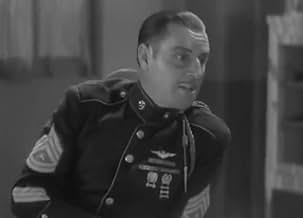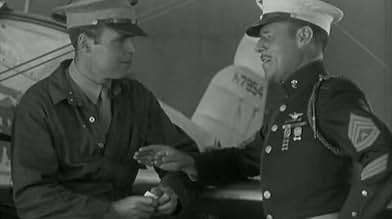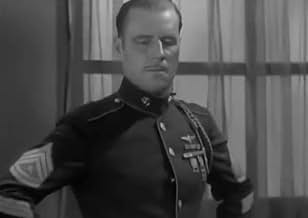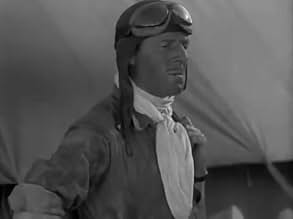NOTE IMDb
6,0/10
418
MA NOTE
Ajouter une intrigue dans votre langueA Marine flyer and his flight school mentor fall for the same beautiful nurse.A Marine flyer and his flight school mentor fall for the same beautiful nurse.A Marine flyer and his flight school mentor fall for the same beautiful nurse.
- Réalisation
- Scénario
- Casting principal
Harold Goodwin
- Steve Roberts
- (as Harald Goodwin)
Joe Bordeaux
- Marine
- (non crédité)
Walter Brennan
- Marine Pilot
- (non crédité)
Eddy Chandler
- Marine Sergeant - Panama's Buddy
- (non crédité)
Edgar Dearing
- Football Coach
- (non crédité)
George Irving
- Marine Colonel in Nicaragua
- (non crédité)
Avis à la une
I recently saw this on Turner Classics. I had never seen this film from the early days of talking pictures before. Adding to its historic value is that it's directed by legendary Frank Capra from early in his career. Actor Ralph Graves who plays Lefty Phillips wrote the story, using two unrelated actual current events of the day to bookend his story; a wrong-way run in the Rose Bowl and a rogue general in Nicaragua. The Phillips character is based on Roy 'Wrong Way' Riegels who played for Cal-Berkeley against Georgia Tech in the 1929 Rose Bowl. He picked up a fumble, was spun around and ran 65 yards the wrong way before being stopped short of the opponent's goal. Lefty is distraught by the humiliation and goes on to join the Marines Navy Air Corps. Riegels would later join the Army Air Corps in WWII so it's kind of like art imitating life and then life imitating art. Jack Holt is Sgt. Panama Williams who trains the pilots. Lila Lee is nurse Elinor Murray, the love interest of both Panama and Lefty. Panama, Lefty and Elinor are all sent to Nicaragua where a rogue general and his guerrilla army have killed US Marines stationed there. In reality US Marines were in Nicaragua from 1927 to 1933. Small individual armies roamed the country and the US government was instituting a unified national guard and set up Anastasio Somoza Garcia to run it. General Augusto César Sandino was a guerrilla leader who's forces fought against the US Marines for five years. In this ficitonalized account of that conflict, Sandino is a character named Lobo played by Jimmy de la Cruze. Elmer Dyer who shot the aerial scenes for such Films as Hell's Angels, Lost Horizon, The Dawn Patrol and Air Force is the principal Ariel photographer on this film and Joe Novak and Joseph Walker are cinematographers. Howard J. Green wrote the screenplay from Graves' original story with additional dialogue from director Capra. Holt had the most successful and long- lived film career of the three lead actors. An established silent film star, he smoothly made the transition to sound films and had a long career in b-westerns and crime movies. Graves was a silent film actor who's continued success was limited to the 1930's. He made a couple films in the 40's in minor roles and then his career was over. Lee was at the peak of her career here having made 11 films in 1928, 9 in 1929 and 6 in 1930 before her career began to taper off. She was a promising silent film actor who never lived up to the expectations the studio had for her after making the transition from silents to sound. This isn't a great film. It's kind of silly and awkward at times but it's well done and fun to see a Capra film just seven years into his directorial career and the film has it's early sound and early aviation historic value. It's worth a look. I would give it a 6.5 out of 10.
The plot is certainly familiar from many other movies, notably "Tell it to the Marines". The old timer versus the cheeky new recruit. And of course the girl that the sergeant wants is actually in love with the recruit, who feels rotten about it because the sergeant has been so nice to him. But the characters are interesting, particularly Jack Holt's,the camaraderie is nice to watch and there is plenty of action, flying scenes and battle scenes,fascinating shots of old time airplanes, all of which make this a fun movie to watch, which after all is the important thing in a movie of this type.Very pleasant entertainment in spite of the sound problems.
Frank Capra takes to the air in this rip off of William Wellman's silent Wings (27) but it never gets off the ground. Capra seems ill equipped to deal with aviation the way WW 1 pilot Wellman is and it shows early on.
Footballer Lefty Phelps makes headlines when he runs the wrong way (ala Roy "Wrong Way" Rigel's Rose Bowl gaffe) in the big game. Shamed beyond belief he joins the Marines after meeting the admirable Panama Williams who offers sympathy and advice. Phelps ends up training to be a pilot under Williams command but he washes out. He stays on in a non-pilot capacity and begins to romance Panama's desire Nurse Murray. Friction ensues between the two but there's a rebellion to fight in Central America and this enables Lefty to redeem himself.
Flight is at a disadvantage from the start due to progress-sound. 29 was a transitional year in sound and it hampers the action and performances. Because cameras were so noisy they had to be sound proofed, restricting movement. Actors were untested in voice and nuance when it came to sound and Capra regular Ralph Graves as Lefty sulking and lumbering about comes up short in both. Tim Holt's father fares far better and Lilla Lee sporting eye lashes as wide as the wings on Von Richthofen's Fokker is more Boop than Bara.
Capra's mise en scene and editing are pedestrian with actors poorly posed (once again to accommodate the microphone) and reacting foolishly to off screen action. There are some decent air acrobatics and a striking approach shot to an enemy fortress but special effects are glaringly poor in spots and overall it remains inferior in every aspect to Wings and thus reaffirms that Silents are golden, especially when its accompanied by a rousing pipe organ score.
Footballer Lefty Phelps makes headlines when he runs the wrong way (ala Roy "Wrong Way" Rigel's Rose Bowl gaffe) in the big game. Shamed beyond belief he joins the Marines after meeting the admirable Panama Williams who offers sympathy and advice. Phelps ends up training to be a pilot under Williams command but he washes out. He stays on in a non-pilot capacity and begins to romance Panama's desire Nurse Murray. Friction ensues between the two but there's a rebellion to fight in Central America and this enables Lefty to redeem himself.
Flight is at a disadvantage from the start due to progress-sound. 29 was a transitional year in sound and it hampers the action and performances. Because cameras were so noisy they had to be sound proofed, restricting movement. Actors were untested in voice and nuance when it came to sound and Capra regular Ralph Graves as Lefty sulking and lumbering about comes up short in both. Tim Holt's father fares far better and Lilla Lee sporting eye lashes as wide as the wings on Von Richthofen's Fokker is more Boop than Bara.
Capra's mise en scene and editing are pedestrian with actors poorly posed (once again to accommodate the microphone) and reacting foolishly to off screen action. There are some decent air acrobatics and a striking approach shot to an enemy fortress but special effects are glaringly poor in spots and overall it remains inferior in every aspect to Wings and thus reaffirms that Silents are golden, especially when its accompanied by a rousing pipe organ score.
Frank Capra made three films with the same two actors, Jack Holt and Ralph Graves, probably in an effort to establish the male buddy film. It would take James Cagney and Pat O'Brien to get that genre off the ground. Flight is the second of those three Graves/Holt films and the first one in sound.
It also has the same kind of roughhouse humor that would characterize the work of John Ford. In fact if you didn't know this was an early Capra film, you'd swear Ford did it.
Flight is certainly a film from the headlines of the day. It begins with college football hero Ralph Graves making a spectacular run in the Rose Bowl, the wrong way. Capra made no secret of it, he was at the Rose Bowl that year with Harry Cohn and saw Roy Rieggles playing for USC get turned around in eluding tacklers and made a spectacular run the wrong way and scored the margin of victory for Georgia Tech. The poor man never lived it down.
In fact Graves decides the Marine Corps is the place for blessed anonymity and he gets involved with aviation under the tutelage of Jack Holt. But the two of them have a falling out over nurse Lila Lees. Later on they see action in Nicaragua where the USA was maintaining a presence in hunting down those original Sandinistas.
The Marine aviators rescue a company of Marines in a Dienbienphu like situation with the Sandinistas. The battle scenes were very well staged.
Flight is not a typical Frank Capra film because Frank Capra had not found his style and type of story. Still it's a well made action film for the time.
It also has the same kind of roughhouse humor that would characterize the work of John Ford. In fact if you didn't know this was an early Capra film, you'd swear Ford did it.
Flight is certainly a film from the headlines of the day. It begins with college football hero Ralph Graves making a spectacular run in the Rose Bowl, the wrong way. Capra made no secret of it, he was at the Rose Bowl that year with Harry Cohn and saw Roy Rieggles playing for USC get turned around in eluding tacklers and made a spectacular run the wrong way and scored the margin of victory for Georgia Tech. The poor man never lived it down.
In fact Graves decides the Marine Corps is the place for blessed anonymity and he gets involved with aviation under the tutelage of Jack Holt. But the two of them have a falling out over nurse Lila Lees. Later on they see action in Nicaragua where the USA was maintaining a presence in hunting down those original Sandinistas.
The Marine aviators rescue a company of Marines in a Dienbienphu like situation with the Sandinistas. The battle scenes were very well staged.
Flight is not a typical Frank Capra film because Frank Capra had not found his style and type of story. Still it's a well made action film for the time.
Frank Capra's first full sound film doesn't have sound anymore, so looking at his second sound film, Flight, shows a technician doing everything he can to take advantage of the new sound while filming a lot outside, challenging himself by pushing against the limits of the contemporaneous technology, and yet it's all in service to a story so thin spread out over one hundred and ten minutes that nothing really connects. If this had come in at a more reasonable 80 minutes instead of 110, I think it could have worked a lot better, however at its extended runtime, it's just much more boring than it should have been.
Lefty Phelps (Ralph Graves) has to live down an embarrassing moment in his college football career when he got mixed up and ran the ball the wrong way down the field to lose the game, an event witnessed by Marine Corps pilot Panama Williams (Jack Holt) who encourages him to join the Marines to gain some purpose in life. The whole subplot of Lefty living down the reputation is kind of odd, especially since news of it only spreads amongst the recruits because he keeps a clipping of the event on him at all times, a clipping that falls out of his pocket and gets picked up by someone who makes fun of him because of the reminder. It's also supposed to feed into this idea at the core of Lefty as a character that he's afraid of trying again, limited by a fear that makes him screw up in similar ways, like when he can't get his aircraft to lift off the ground at his graduation test.
The actual dramatic meat of the film ends up being a little love triangle between Lefty, Panama, and the nurse Elinor (Lila Lee). Panama is really consumed with her though she is only really polite in return. She becomes enamored of the young, more handsome Lefty, but Lefty is too loyal to Panama for helping him out of his funk and bringing him along on the later stage mission to Nicaragua as his mechanic to go selfish regarding his own desires towards Elinor.
And that's kind of it. It's a very simple love triangle that takes a while to develop over the film, doesn't have a whole lot of dimension to it, but is earnestly told with a couple of nice little mechanical twists to it (like Panama getting Lefty as his mechanic). For a short melodrama it might have been enough, but this is a nearly two hour film.
The final bit is dominated by this sudden, underdeveloped need for the Marines to use airplanes against bandits in Nicaragua against a bandit named Lobo (Jimmy De La Cruze). It's handled with some quick dialogue that he's attacked some Americans there, the actual battle is a technically competent execution of capturing action in flight while the actual stakes are thin and hardly ever explained in anything other than the broadest of detail. There's a bit where Lefty ends up behind enemy lines that very closely mirrors the similar third act mechanics of Submarine with the slight benefit of Panama sacrificing one other soldier other than Lefty than a submarine full of them, combined with the fact that we know that Lefty is the only one left alive from the crash (something Panama doesn't know). The pique is, of course, sourced from the love triangle dynamics, and it sort of works in this melodramatic context, but only sort of.
The sound design, since its so early in the sound era and fascinates me, is this curious mixture of experiments, some that work others that don't, of trying to make a soundscape pleasing to the audience. On the one hand, the opening football game has a surprising uniformity to the background, possibly executed by capturing a similar roar of cheers across all of the shots (it really does feel like this is still the moment when sound mixing hadn't been applied to film soundtracks yet). There is also this tendency to drop out all sound in between lines of dialogue on scenes filmed outside, so we get the ambiance of the field when someone says something, all sound drops out for a second, and then someone else speaks and that ambiance comes back. It's kind of weird, but Capra and his sound team was trying to make this whole sound thing work, at least.
So, I'd probably say that Submarine is the better of the two Howard Hawks-like films that Capra had made up to this point. Hawks made them better because he had a stronger sense of these types of characters and had a more interesting way to portray these women as strong and belonging in the world instead of waifishly sitting around while things happen around her. For a better look at airmen of the time, I'd recommend Hawks' version of The Dawn Patrol, but he was juggling these kinds of love triangles even in stuff like Tiger Shark.
Anyway, it was okay. Its story is fine, just not very meaty, and the spectacle is pretty good, if unsupported by much narrative. It's a middling little adventure and melodrama that has understandably been largely forgotten by everyone save Capra completists.
Lefty Phelps (Ralph Graves) has to live down an embarrassing moment in his college football career when he got mixed up and ran the ball the wrong way down the field to lose the game, an event witnessed by Marine Corps pilot Panama Williams (Jack Holt) who encourages him to join the Marines to gain some purpose in life. The whole subplot of Lefty living down the reputation is kind of odd, especially since news of it only spreads amongst the recruits because he keeps a clipping of the event on him at all times, a clipping that falls out of his pocket and gets picked up by someone who makes fun of him because of the reminder. It's also supposed to feed into this idea at the core of Lefty as a character that he's afraid of trying again, limited by a fear that makes him screw up in similar ways, like when he can't get his aircraft to lift off the ground at his graduation test.
The actual dramatic meat of the film ends up being a little love triangle between Lefty, Panama, and the nurse Elinor (Lila Lee). Panama is really consumed with her though she is only really polite in return. She becomes enamored of the young, more handsome Lefty, but Lefty is too loyal to Panama for helping him out of his funk and bringing him along on the later stage mission to Nicaragua as his mechanic to go selfish regarding his own desires towards Elinor.
And that's kind of it. It's a very simple love triangle that takes a while to develop over the film, doesn't have a whole lot of dimension to it, but is earnestly told with a couple of nice little mechanical twists to it (like Panama getting Lefty as his mechanic). For a short melodrama it might have been enough, but this is a nearly two hour film.
The final bit is dominated by this sudden, underdeveloped need for the Marines to use airplanes against bandits in Nicaragua against a bandit named Lobo (Jimmy De La Cruze). It's handled with some quick dialogue that he's attacked some Americans there, the actual battle is a technically competent execution of capturing action in flight while the actual stakes are thin and hardly ever explained in anything other than the broadest of detail. There's a bit where Lefty ends up behind enemy lines that very closely mirrors the similar third act mechanics of Submarine with the slight benefit of Panama sacrificing one other soldier other than Lefty than a submarine full of them, combined with the fact that we know that Lefty is the only one left alive from the crash (something Panama doesn't know). The pique is, of course, sourced from the love triangle dynamics, and it sort of works in this melodramatic context, but only sort of.
The sound design, since its so early in the sound era and fascinates me, is this curious mixture of experiments, some that work others that don't, of trying to make a soundscape pleasing to the audience. On the one hand, the opening football game has a surprising uniformity to the background, possibly executed by capturing a similar roar of cheers across all of the shots (it really does feel like this is still the moment when sound mixing hadn't been applied to film soundtracks yet). There is also this tendency to drop out all sound in between lines of dialogue on scenes filmed outside, so we get the ambiance of the field when someone says something, all sound drops out for a second, and then someone else speaks and that ambiance comes back. It's kind of weird, but Capra and his sound team was trying to make this whole sound thing work, at least.
So, I'd probably say that Submarine is the better of the two Howard Hawks-like films that Capra had made up to this point. Hawks made them better because he had a stronger sense of these types of characters and had a more interesting way to portray these women as strong and belonging in the world instead of waifishly sitting around while things happen around her. For a better look at airmen of the time, I'd recommend Hawks' version of The Dawn Patrol, but he was juggling these kinds of love triangles even in stuff like Tiger Shark.
Anyway, it was okay. Its story is fine, just not very meaty, and the spectacle is pretty good, if unsupported by much narrative. It's a middling little adventure and melodrama that has understandably been largely forgotten by everyone save Capra completists.
Le saviez-vous
- AnecdotesThe wrong-way run was based on the infamous play by Roy Riegels of the University of California in the 1929 Rose Bowl. With the score 0-0 in the second quarter, Riegels recovered a Georgia Tech fumble at the Yellow Jackets' 30, but he somehow got turned the wrong way and ran 65 yards toward his own goal line. A teammate grabbed him, but he was dropped at his own 1. The Golden Bears elected to punt, the punt was blocked out of the end zone for a safety touch and the two points provided the margin of victory in Georgia Tech's 8-7 win. The movie uses actual footage of Riegels from the game.
- GaffesWhen Lefty Phelps is polishing an aircraft, Sergeant Williams calls to him by yelling "Hey, soldier!" As both men are US Marines, the sergeant would not have addressed him that way. Soldiers are members of the US Army and a Marine would actually consider that remark to be an insult.
- Citations
Steve Roberts: [On the Nicaraguan rebels] You know damn well what's going to happen if these people come along and catch you alive.
- ConnexionsFeatured in Frank Capra, il était une fois l'Amérique (2020)
- Bandes originalesMy Mammy
(1921) (uncredited)
Music by Walter Donaldson
Lyrics by Sam Lewis and Joe Young
Sung a bit a cappella by Ralph Graves
Meilleurs choix
Connectez-vous pour évaluer et suivre la liste de favoris afin de recevoir des recommandations personnalisées
Détails
- Durée1 heure 50 minutes
- Couleur
Contribuer à cette page
Suggérer une modification ou ajouter du contenu manquant

Lacune principale
By what name was Les Mousquetaires de l'air (1929) officially released in India in English?
Répondre



























